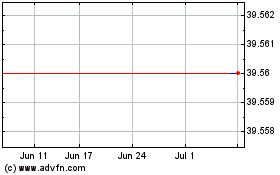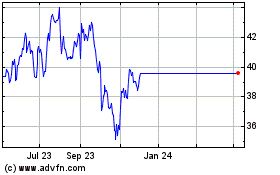Globally, pandemic caused $220bn of
dividends cuts
- North America accounted for 49% of the world’s dividends in
2020
- Banks accounted for one third of global dividend reductions by
value
- Global dividends expected to begin to recover from April
onwards
During the worst crisis since World War II, US dividends proved
resilient, increasing 2.6% year-over-year to a record high of
$503.1 billion in 2020, as just one in fourteen US companies
cancelled its dividend between April and December according to the
latest edition of the Janus Henderson Global Dividend Index.
This press release features multimedia. View
the full release here:
https://www.businesswire.com/news/home/20210222005102/en/
(Graphic: Business Wire)
Globally, dividends fell to $1.26 trillion during the year, down
12.2% on a headline basis. This was better than Janus Henderson’s
best-case forecast of $1.21 trillion thanks to a less severe fall
in Q4 payouts than anticipated. Janus Henderson’s index of global
dividends fell to 172.4, a level last seen in 2017.
The dividend cuts were most severe in the UK and Europe, which
together accounted for more than half the total reduction in
payouts globally, mainly owing to the forced curtailment on banking
dividends by regulators. In North America, companies were able to
conserve cash and protect their dividends by suspending or reducing
share buybacks instead, and regulators were more lenient with the
banks. In Asia, Australia was worst affected, thanks to its heavy
reliance on banking dividends, which were constrained by regulators
until December. Elsewhere, China, Hong Kong and Switzerland joined
Canada among the best performing nations.
Q4 ended the year with a smaller fall than feared
Globally, Q4 payouts fell 14.0% on an underlying basis to a
total of $269.1bn while the headline decline was just 9.4%. This
was less severe than expected as companies like Sberbank in Russia
and Volkswagen in Germany restored suspended dividends at full
strength, while others like Essilor in France brought them back at
a reduced level. Special dividends were also larger than expected,
while in the US the dividends announced for the next four quarterly
payments were better than expected.
How did Covid-19 affect global dividends?
Although cuts and cancellations globally totalled $220bn between
April and December 2020, companies nevertheless paid their
shareholders $965bn, still far outweighing the reductions. One
company in eight cancelled its payout altogether and one in five
made a cut, but two thirds increased their dividends or held them
steady. Banks accounted for one third of global dividend reductions
by value, more than three times as much as oil producers – the next
most severely affected sector. Six in ten consumer discretionary
companies cut or cancelled payouts, but the classic defensives -
food retail, pharmaceuticals and personal products - were well
insulated. Among the world’s larger stock markets, the impact in
Spain and France was particularly widespread with 71% of companies
making reductions compared to just 9% in Canada.
Outlook
Payouts are expected to fall in Q1 2021, although the decline is
likely to be smaller than between Q2 and Q4 2020. The outlook for
the full year remains extremely uncertain. The pandemic has
intensified in many parts of the world, even as vaccine rollouts
provide hope. Importantly, banking dividends will resume in
countries where they were curtailed, but they will not come close
to 2019 levels in Europe and the UK, and this will limit the
potential for growth. Those parts of the world that proved
resilient in 2020 look likely to repeat this performance in 2021,
but some sectors are likely to continue to struggle until economies
can reopen fully.
A slow escape from the pandemic, and the drag caused by the
first quarter, suggest that global dividends may fall by 2%
(headline) for the full year in a worst-case scenario (-3%
underlying). A best-case at this stage suggests an increase of 2%
on an underlying basis, equivalent to a headline rise of 5%,
yielding a total of $1.32 trillion.
Matt Peron, Director of Research at Janus Henderson said:
“Covid-19’s impact on dividends varied significantly across
different regions and sectors, which underscores the importance of
taking a diversified approach to income investing. With the first
set of 2021 dividend announcements in the US looking better than
projected, central-bank policy expected to keep interest rates low
and economies poised to rebound as vaccine distribution expands,
equity income strategies will be increasingly important for many
investors.”
Unless otherwise stated all data is sourced by Janus Henderson
Investors as of 31 December 2020.
Past performance is no guarantee of future results.
International investing involves certain risks and increased
volatility not associated with investing solely in the UK. These
risks included currency fluctuations, economic or financial
instability, lack of timely or reliable financial information or
unfavourable political or legal developments.
Notes to editors
Janus Henderson Group (JHG) is a leading global active asset
manager dedicated to helping investors achieve long-term financial
goals through a broad range of investment solutions, including
equities, fixed income, quantitative equities, multi-asset and
alternative asset class strategies.
At 30 September 2020, Janus Henderson had approximately US$358
billion in assets under management, more than 2,000 employees, and
offices in 27 cities worldwide. Headquartered in London, the
company is listed on the New York Exchange (NYSE) and the
Australian Securities Exchange (ASX).
Methodology
Each year Janus Henderson analyse dividends paid by the 1,200
largest firms by market capitalisation (as at 31/12 before the
start of each year). Dividends are included in the model on the
date they are paid. Dividends are calculated gross, using the share
count prevailing on the pay date (this is an approximation because
companies in practice fix the exchange rate a little before the pay
date), and converted to US$ using the prevailing exchange rate.
Where a scrip dividend is offered, investors are assumed to opt
100% for cash. This will slightly overstate the cash paid out, but
we believe this is the most proactive approach to treat scrip
dividends. In most markets it makes no material difference, though
in some, particularly European markets, the effect is greater.
Spain is a particular case in point. The model takes no account of
free floats since it is aiming to capture the dividend paying
capacity of the world’s largest listed companies, without regard
for their shareholder base. We have estimated dividends for stocks
outside the top 1,200 using the average value of these payments
compared to the large cap dividends over the five-year period
(sourced from quoted yield data). This means they are estimated at
a fixed proportion of 12.7% of total global dividends from the top
1,200, and therefore in our model grow at the same rate. This means
we do not need to make unsubstantiated assumptions about the rate
of growth of these smaller company dividends. All raw data was
provided by Exchange Data International with analysis conducted by
Janus Henderson Investors.
This press release is solely for the use of members of the
media and should not be relied upon by personal investors,
financial advisers or institutional investors. We may record
telephone calls for our mutual protection, to improve customer
service and for regulatory record keeping purposes.
Issued by Janus Henderson Investors. Janus Henderson Investors
is the name under which investment products and services are
provided by Janus Capital International Limited (reg no. 3594615),
Henderson Global Investors Limited (reg. no. 906355), Henderson
Investment Funds Limited (reg. no. 2678531), Henderson Equity
Partners Limited (reg. no.2606646), (each registered in England and
Wales at 201 Bishopsgate, London EC2M 3AE and regulated by the
Financial Conduct Authority) and Henderson Management S.A. (reg no.
B22848 at 2 Rue de Bitbourg, L-1273, Luxembourg and regulated by
the Commission de Surveillance du Secteur Financier). Henderson
Secretarial Services Limited (incorporated and registered in
England and Wales, registered no. 1471624, registered office 201
Bishopsgate, London EC2M 3AE) is the name under which company
secretarial services are provided. All these companies are wholly
owned subsidiaries of Janus Henderson Group plc. (incorporated and
registered in Jersey, registered no. 101484, with registered office
at 47 Esplanade, St Helier, Jersey JE1 0BD).
[Janus Henderson, Janus, Henderson, Perkins, Intech,
VelocityShares, Knowledge Shared, Knowledge. Shared and Knowledge
Labs] are trademarks of Janus Henderson Group plc or one of its
subsidiaries. © Janus Henderson Group plc.
View source
version on businesswire.com: https://www.businesswire.com/news/home/20210222005102/en/
Sarah Johnson T: 720-364-0708 E:
sarah.johnson@janushenderson.com
Janus Henderson (ASX:JHG)
Historical Stock Chart
From Mar 2024 to Apr 2024

Janus Henderson (ASX:JHG)
Historical Stock Chart
From Apr 2023 to Apr 2024
